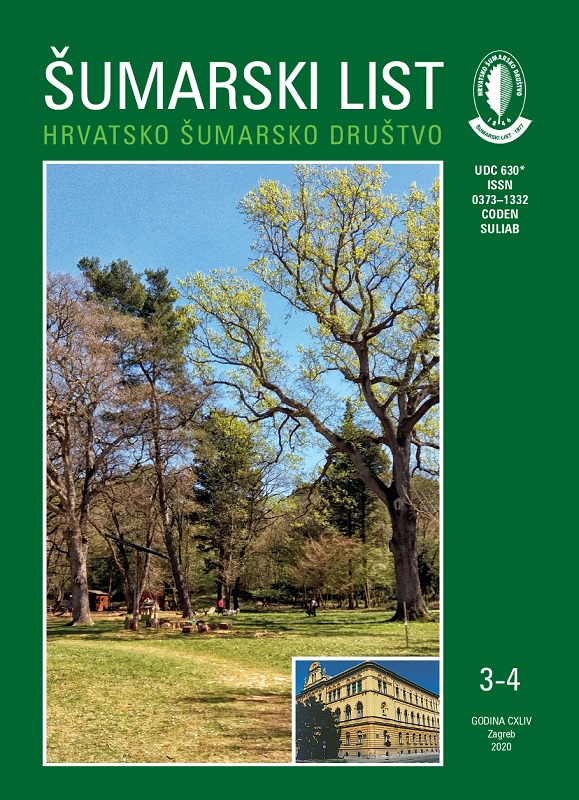
broj: 3-4/2020
pdf (11,43 MB) |
|
||||||||||||||
| RIJEČ UREDNIŠTVA | ||
| Uredništvo | ||
| Croatian forests Ltd - feudal lord or law enforcer? pdf HR EN | 117 | |
| EDITORIAL We should never be concerned about the themes and topicality of this column of Forestry Journal. Every now and then the media reports on the latest misunderstandings and even conflicts between the forestry profession and amateur associations which imagine that they know everything about forestry. Interestingly, they never meddle in surgery, for example. The Voice of Istria recently wrote: The battle of the Motovun Forest continues - Truffle hunting people strike back: The company Croatian Forests Ltd behaves like a feudal lord! This topic will be dealt with more extensively on the basis of exact data in one of the columns of the next double issue of Forestry Journal. Feudalism is a form of social system that prevailed in the Middle and part of the New Age and was abolished in 1848. A feudal lord was a land owner who had other people working for him. Is the company Croatian Forests Ltd the owner of the land - forest and does it match these criteria? To answer these questions we should first consult the law, in this case the Forest Law. Article 2 (1) of the said Law states: Forests and forest land are natural goods of interest to the Republic of Croatia and enjoy its particular protection. In the same article (3) it is stated that the Government of the Republic of Croatia manages forests and forest land in the interest of the Republic of Croatia according to the principles listed further on. Article 3 (1) states: Forests and forest land constitute specific forest wealth and together with non-market and market forest functions dictate a particular manner of planning, management and usage according to the principles of sustainable forest management. (2) Sustainable management of forests means using forests and forest land in the manner and to the extent to which it maintains its biodiversity, productivity, regeneration capacity, vitality and potential to, now and in the future, fulfil the relevant ecological, economic and social functions locally, nationally and globally without inflicting harm to other ecosystems. The Croatian forestry profession has applied the principle of sustainability to Croatian forests for over 250 years. In addition to commercial forest functions (production of wood assortments, production of forest reproductive material and production of non-wood forest products), we should bear in mind that it also ensures its non-market functions listed in article 4 (1) to (9). Therefore, management of this most complex ecosystem excludes amateurism and interest groups! Sadly and illogically, but true, politics which should strictly enforce the Law, is more often inclined to them than to the profession. In view of what was said above about the forest as specific forest wealth, it is logical that it should operatively be managed by a specific legal entity which has the necessary infrastructure, equipment and highly skilled personnel in particular. As for highly skilled personnel, we repeatedly point out that it was decided no later than 19th century that forests should be managed by academically educated experts. Furthermore, the university forestry education in Croatia was established as early as 20th October 1898. It is logical, therefore, that the Government of the Republic of Croatia entrusted the company Croatian Forests Ltd, a public forest owner which it founded, with forest planning and management. Article 44 (1) states: The public forest owner and Institution (in case of protected forests) are obliged by law to ensure the protection of forests and forest land owned by the Republic of Croatia from unlawful appropriation, use and other illegal activities, as well as enforce the forest order. Clearly, everything is regulated by law: hence, the company Croatian Forests Ltd is the law enforcer and by no means a feudal lord. Yet, when we discuss the situation in our State, starting from social relations, economy and excessive import of “anything and everything”, we all swear by the legal State, but only when it is in our favour, while public interest is of no concern whatsoever. Editorial Board | ||
| IZVORNI ZNANSTVENI ČLANCI | ||
| Mario Ančić, Renata Pernar, Milan Bajić, Andrija Krtalić, Ante Seletković, Dubravko Gajski, Jelena Kolić | UDK 630*120 (001) https://doi.org/10.31298/sl.144.3-4.1 | |
| Spectral signatures (endmembers) some of forest species in the Republic of Croatia pdf HR EN | 119 | |
| Goran Gužvica, Monika Petković, Marko Augustinović, Lidija Šver | UDK 630* 153 (Canis aureus) (001) https://doi.org/10.31298/sl.144.3-4.2 | |
| Research of golden jackal (Canis aureus) in the Nature park Lonjsko polje by acoustic and camera traps methods pdf HR EN | 129 | |
| Danijela Miljković, Dijana Čortan | UDK 630* 164 (001) https://doi.org/10.31298/sl.144.3-4.3 | |
| Morphometric and morphological analysis of Populus nigra L. leaves in flooded regions pdf HR EN | 139 | |
| Velid Halilović, Jusuf Musić, Jelena Knežević, Mario Šarić, Besim Balić, Dalibor Ballian | UDK 630* 360 +462 (001) https://doi.org/10.31298/sl.144.3-4.4 | |
| Research of mechanical damage on fir trees and other tree species during exploitation – Case forestry “Glamoč“ pdf HR EN | 149 | |
| Hanife Erdogan Genç, Ali Ömer Üçler | UDK 630* 232.3 (001) https://doi.org/10.31298/sl.144.3-4.5 | |
| Effects of different treatments on seed dormancy breaking and germination in Acer cappadocicum Gleditsch var. cappadocicum pdf HR EN | 159 | |
| PREGLEDNI ČLANCI | ||
| Goran Marinković, Ilija Grgić, Jelena Lazić, Milan Trifković | UDK 630* 424 + 266 + 913 https://doi.org/10.31298/sl.144.3-4.6 | |
| Land consolidation in the function of shelterbelts for agricultural land in the Republic of Serbia – Crtical review pdf HR EN | 167 | |
| STRUČNI ČLANCI | ||
| Damir Drvodelić, Milan Oršanić | UDK 630* 279 https://doi.org/10.31298/sl.144.3-4.7 | |
| Grafting cultivars of decorative japanese maples pdf HR EN | 179 | |


